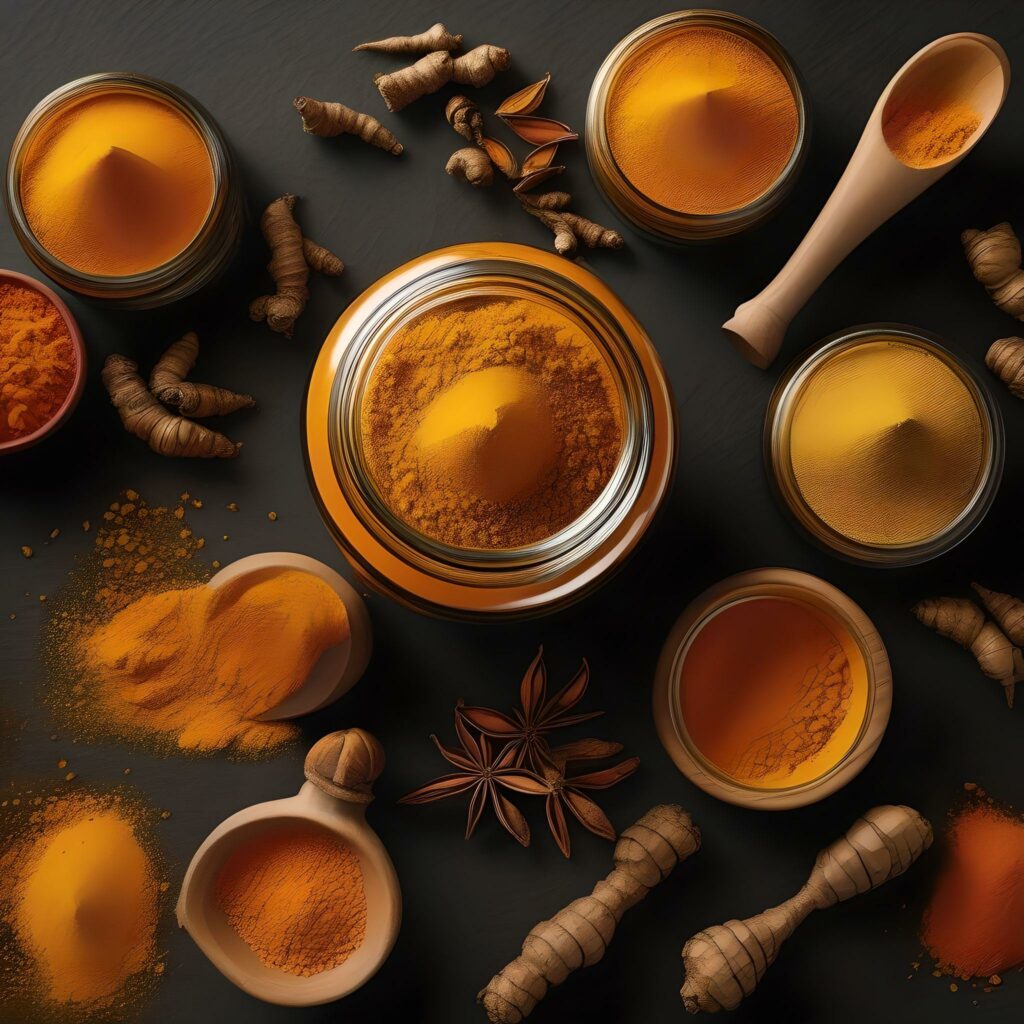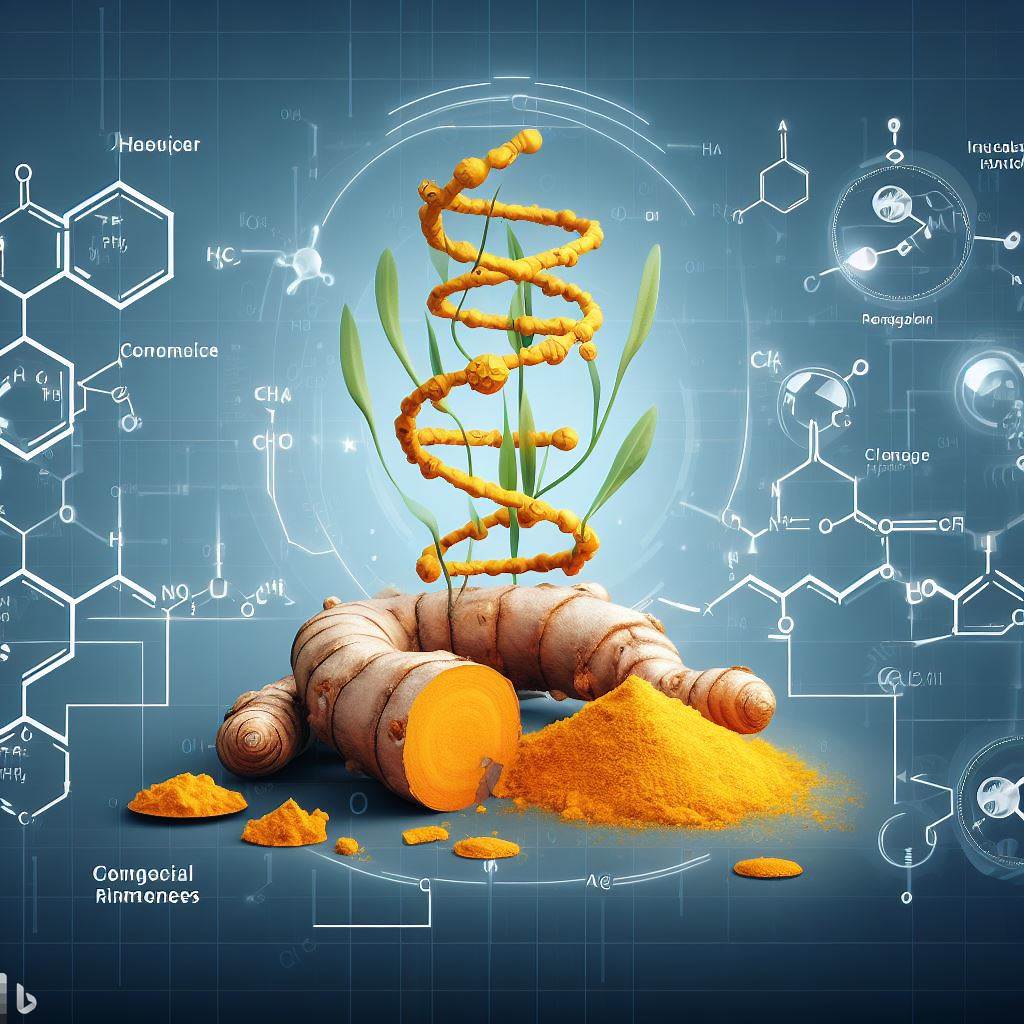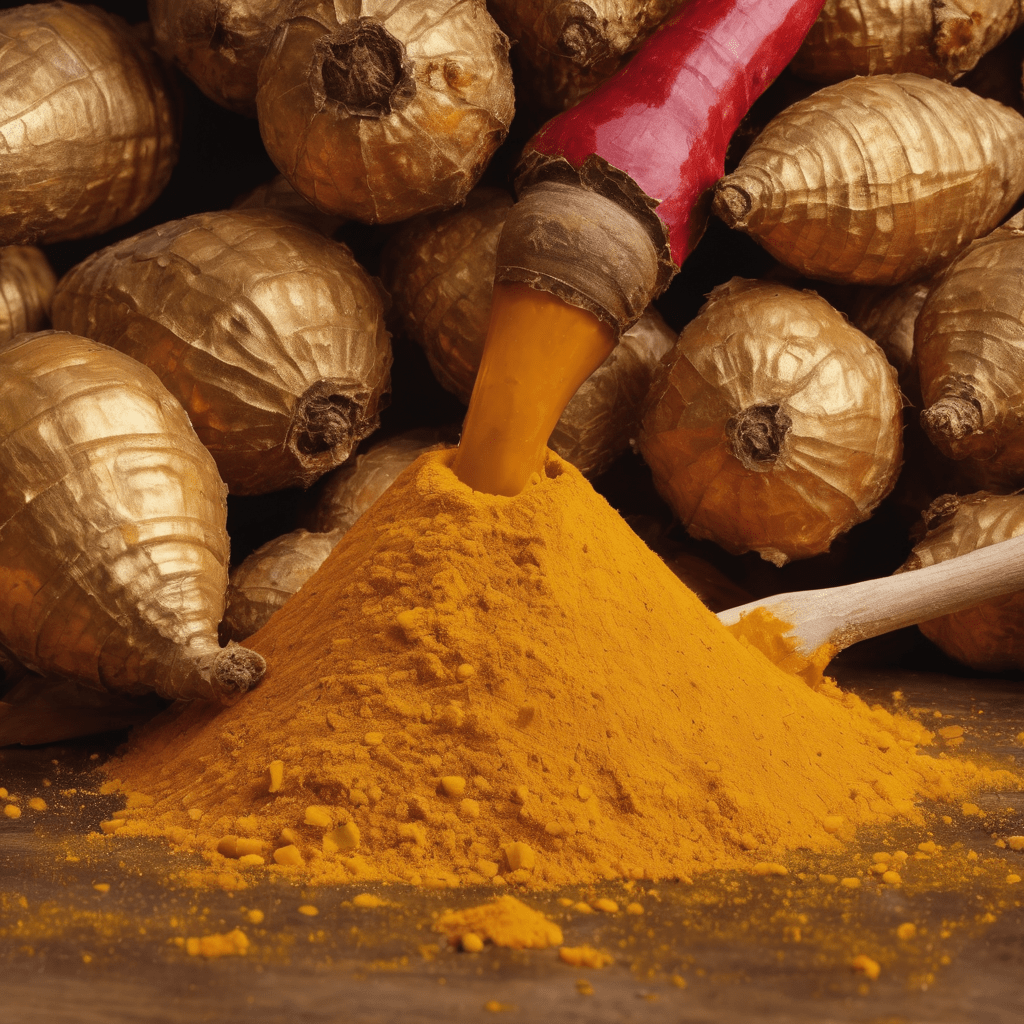
Imagine a golden warrior armed with the power to fight cancer. That warrior is turmeric, a spice renowned for its potent cancer-prevention properties.
In this article, we delve into the scientific evidence behind turmeric’s ability to combat cancer. From its anti-inflammatory effects to its role in repairing DNA and turmeric’s antioxidant properties and potential as an adjunctive cancer treatment, we explore how this humble spice can be a powerful ally in the battle against cancer.
Key Takeaways
- Turmeric’s active compound curcumin has been shown to inhibit cancer cell growth and proliferation.
- Turmeric’s anti-inflammatory properties can help reduce chronic inflammation, which can lead to the development of cancer.
- Turmeric’s curcumin activates enzymes involved in DNA repair, promoting genetic stability and reducing the risk of cancer.
- Turmeric contains antioxidants, particularly curcumin, that protect cells from free radical damage and help prevent oxidative stress and chronic diseases.
Turmeric and Cancer: An Overview
If you’re curious about the connection between turmeric and cancer, this overview will provide you with a comprehensive understanding. Turmeric, with its active compound curcumin, has been studied extensively for its potential anti-cancer properties. However, when it comes to the effectiveness of turmeric’s role in preventing or treating cancer, there are a few important factors to consider.
Benefits of Aloe Vera and Turmeric: A Powerful Combination
Turmeric’s bioavailability—the quantity of curcumin that is absorbed and used by the body—is one important component. Unfortunately, curcumin has poor bioavailability when taken orally, meaning that it is not easily absorbed into the bloodstream. To overcome this limitation, researchers have explored various strategies, such as combining curcumin with other compounds or using nanoformulations to enhance its bioavailability.
https://www.sciencedirect.com/science/article/abs/pii/S0009279719308610
Another important consideration is the potential interaction between turmeric and chemotherapy. While some studies suggest that turmeric can enhance the effectiveness of certain chemotherapy drugs, others indicate that it may interfere with their action. Therefore, it is crucial to consult with your healthcare provider before incorporating turmeric into your cancer treatment regimen.
Turmeric’s Anti-Inflammatory Effects
Turmeric’s anti-inflammatory effects play a crucial role in its potential as a cancer-preventive agent. Inflammation is a natural response of the immune system to injury or infection, but chronic inflammation can lead to the development of many diseases, including cancer. Turmeric, with its active compound curcumin, has been shown to possess strong anti-inflammatory properties.
https://koreascience.kr/article/JAKO201417048539318.page

Turmeric’s role in pain management is closely related to its anti-inflammatory effects. Chronic pain often results from inflammation, and turmeric has been used for centuries in traditional medicine to alleviate pain.
Studies have shown that curcumin can inhibit the production of inflammatory mediators, such as prostaglandins and cytokines, which are involved in the pain signaling pathway. This can provide relief for individuals suffering from conditions such as arthritis, muscle strains, and joint pain.
Turmeric also has a notable impact on autoimmune diseases. When the body’s immune system unintentionally targets healthy cells and tissues, autoimmune diseases result. Since inflammation is a major feature of these illnesses, turmeric’s anti-inflammatory properties may mitigate the severity of symptoms. Research has indicated that curcumin has the ability to suppress immune cells involved in autoimmune responses, potentially providing relief to individuals with lupus, multiple sclerosis, and rheumatoid arthritis.
Growth of Cancer Cells and Curcumin
Because it impedes the growth and proliferation of cancer cells via a number of mechanisms, curcumin is a useful drug in the prevention and treatment of cancer. Studies have revealed that curcumin targets multiple signaling pathways involved in the initiation and progression of cancer as part of its mechanism of action.
Nuclear factor kappa B (NF-κB), a transcription factor required for cell growth and survival, is inhibited by curcumin. One of the main ways curcumin keeps cancer at bay is through this. Cancer cells frequently have overactive NF-κB, which encourages the growth of the cells and increases their resistance to dying. Because curcumin inhibits NF-κB activation, it suppresses the growth of cancer cells and triggers programmed cell death.
https://link.springer.com/article/10.1186/1757-2215-3-11
Moreover, curcumin has been observed to alter the expression of several genes linked to the control of the cell cycle, angiogenesis, apoptosis, and metastasis. Curcumin selectively targets these genes, interfering with the intricate cellular mechanisms that facilitate the growth and metastasis of cancer cells.
Curcumin has been shown in numerous in vitro and animal studies to be effective in inhibiting the growth and multiplication of various cancer cell types, including those found in the liver, prostate, lung, breast, and colon. Furthermore, promising outcomes from clinical trials have indicated curcumin’s potential as an adjuvant for cancer treatment.
Turmeric’s Role in DNA Repair

As you delve deeper into the topic of turmeric’s cancer prevention properties, it is important to understand its significant role in DNA repair. DNA repair is a crucial process that helps maintain the integrity and stability of our genetic material.
https://www.jstor.org/stable/48504043
When DNA damage occurs, it can lead to mutations that have the potential to cause cancer. Turmeric, specifically its active compound curcumin, has been found to play a role in enhancing DNA repair mechanisms.
Studies have demonstrated that curcumin can activate enzymes that are involved in DNA repair, including XRCC1 (X-ray repair cross-complementing protein 1) and PARP-1 (Poly ADP-ribose polymerase-1). These enzymes are in charge of fixing various forms of DNA damage, such as base modifications and single-strand breaks. Turmeric reduces the chance of genetic instability and the onset of cancer by raising the activity of these enzymes, which aid in the prompt and effective repair of DNA.
To emphasize the importance of turmeric’s role in DNA repair, let’s take a look at the following table:
| Enzymes for DNA Repair | Role |
|---|---|
| PARP-1 | Repairs single-strand breaks |
| XRCC1 | Repairs base modifications |
Turmeric’s Antioxidant Properties
Turmeric For Kidney Disease: Powerful Natural Alternative
Turmeric has strong antioxidant qualities, so you should eat it frequently. Antioxidants are compounds that assist in shielding your cells from oxidative stress and chronic diseases resulting from free radical damage. Free radicals are unstable molecules. Among the many substances found in turmeric that have antioxidant properties is curcumin, which is also the most active ingredient. The following are five advantages of supplementing with turmeric for antioxidants:
- Reduces inflammation: Turmeric’s antioxidants can help reduce inflammation in the body, which is linked to various chronic diseases, including cancer, heart disease, and diabetes.
- Protects against oxidative stress: Turmeric’s antioxidants neutralize free radicals and prevent them from causing damage to your cells, protecting you from oxidative stress and its harmful effects.
- Supports brain health: The antioxidants in turmeric can cross the blood-brain barrier and help protect the brain from oxidative damage, potentially reducing the risk of neurodegenerative diseases like Alzheimer’s.
- Boosts immune function: Turmeric’s antioxidants can enhance the immune system’s ability to fight off infections and diseases by protecting immune cells from damage.
- Heart health is enhanced. Studies have indicated that the antioxidants in turmeric can lessen oxidative stress, inflammation, and the chance of developing heart disease.
https://www.hindawi.com/journals/jfq/2017/8471785/
These antioxidant advantages can be obtained by including turmeric in your diet or by taking supplements that contain turmeric, which will promote your general health and wellbeing.
Turmeric and the Spread of Cancer
To prevent cancer metastasis, incorporating turmeric into your diet or taking turmeric supplements is highly recommended. Turmeric has been found to have a significant effect on tumor growth and can inhibit the migration of cancer cells.
Research studies have shown that curcumin, the main active compound in turmeric, can suppress the growth of various types of tumors. It does this by targeting multiple pathways involved in tumor progression, including cell proliferation, angiogenesis, and apoptosis. Curcumin has also been shown to inhibit the production of certain proteins that promote tumor growth.
https://www.frontiersin.org/articles/10.3389/fchem.2014.00113/full
Furthermore, turmeric has been found to have a direct impact on cancer cell migration, which is a critical step in cancer metastasis. Studies have demonstrated that curcumin can inhibit the movement and invasion of cancer cells. It does this by suppressing the activity of proteins that are involved in the migration and invasion processes.
Incorporating turmeric into your daily diet is a simple and effective way to potentially reduce the risk of cancer metastasis. You can add turmeric powder to your cooking, sprinkle it on salads, or even make turmeric tea. Alternatively, you can take turmeric supplements to ensure a consistent intake of curcumin. However, it is important to consult with a healthcare professional before starting any new supplements.
Turmeric’s Potential as an Adjunctive Cancer Treatment

Incorporating turmeric into your cancer treatment regimen can potentially enhance its effectiveness as an adjunctive therapy.
https://www.sciencedirect.com/science/article/abs/pii/B9780444640574000065
Turmeric is known for its anti-inflammatory and antioxidant properties, which have been shown to have potential benefits in cancer treatment.
Here are some key points to consider about turmeric’s potential as an adjunctive cancer treatment:
- Bioavailability: Turmeric contains a compound called curcumin, which is responsible for many of its health benefits. However, curcumin is poorly absorbed by the body, leading to low bioavailability. To improve its bioavailability, turmeric can be consumed with black pepper or combined with fats, such as coconut oil or olive oil.
- Anti-cancer effects: Numerous studies have demonstrated that curcumin has anti-cancer properties. It can inhibit the growth of cancer cells, induce apoptosis (cell death), and prevent the spread of cancer to other parts of the body.
- Synergistic effects: Turmeric can enhance the efficacy of conventional cancer treatments, such as chemotherapy and radiation therapy. It has been found to sensitize cancer cells to these treatments, making them more susceptible to their effects.
- Reduced side effects: Turmeric may help alleviate the side effects of cancer treatments. Its anti-inflammatory properties can reduce inflammation and pain, while its antioxidant activity can protect healthy cells from damage caused by treatment.
- Potential as a preventive therapy: Turmeric’s cancer-preventive properties make it a promising adjunctive therapy for individuals at high risk of developing cancer. Its ability to inhibit tumor formation and reduce the growth of precancerous cells makes it a potential preventive agent.
Incorporating turmeric into your cancer treatment regimen as an adjunctive therapy can potentially enhance its effectiveness, reduce side effects, and provide additional cancer-preventive benefits. However, it is important to consult with your healthcare provider before making any changes to your treatment plan.
Scientific Evidence and Promising Studies
Turmeric’s association with cancer prevention isn’t purely anecdotal. There is a growing body of scientific research supporting the potential of curcumin to reduce the risk of various types of cancer. Some of the most compelling findings include:
- Colorectal Cancer: Several studies have indicated that curcumin may reduce the risk of colorectal cancer. It appears to inhibit the growth of cancer cells and promote their destruction, potentially playing a role in both prevention and treatment.
- Breast Cancer: Curcumin has shown promise in studies related to breast cancer. It can interfere with the signaling pathways that promote the growth of breast cancer cells and may enhance the effectiveness of traditional cancer treatments.
- Prostate Cancer: Research has suggested that curcumin may slow the progression of prostate cancer. It can influence the genes and molecules involved in cancer development and inhibit the invasion of cancer cells into surrounding tissues.
- Lung Cancer: In lung cancer, curcumin has demonstrated the ability to suppress the growth of cancer cells and induce cell death. It may also mitigate the side effects of chemotherapy and radiation therapy.
Turmeric For Thyroid Disorder: A Powerful natural alternative
While these findings are promising, it’s essential to note that more extensive clinical trials are needed to establish the precise dosages and protocols for using turmeric and curcumin in cancer prevention and treatment. Additionally, individual responses may vary, and turmeric should not be considered a standalone treatment but rather a complementary approach alongside conventional medical treatments.
Frequently Asked Questions
Are There Any Potential Side Effects or Risks Associated With Consuming Turmeric for Cancer Prevention?
When consuming turmeric for cancer prevention, it is important to be aware of potential side effects or risks. Turmeric may interact with certain medications and can cause digestive issues such as stomach upset or diarrhea. Additionally, high doses of turmeric may lead to liver problems. It is recommended to consult with a healthcare professional before incorporating turmeric into your cancer prevention regimen, especially if you have any pre-existing health conditions.
How Much Turmeric Should Be Consumed Daily to Reap Its Cancer Prevention Benefits?
Knowing how much turmeric to eat each day is crucial if you want to include it in your diet to prevent cancer. Turmeric’s benefits in preventing cancer primarily stem from its ability to lower oxidative stress and inflammation. Although a precise daily recommendation is unknown, research indicates that 1-3 grams of turmeric should be consumed daily. You can accomplish this by taking turmeric supplements, brewing turmeric tea, or mixing turmeric powder into your meals. Never forget to seek medical advice before implementing any big dietary adjustments.
Can Turmeric Be Used as a Standalone Treatment for Cancer, or Is It Only Effective as an Adjunctive Therapy?
Turmeric can be a valuable addition to cancer treatment, but it is not typically used as a standalone therapy. While research suggests that turmeric may help prevent cancer, its effectiveness as a primary treatment for existing cancer is still being studied. It is more commonly used as an adjunctive therapy alongside conventional treatments like chemotherapy and radiation. As always, it is important to consult with your healthcare provider to determine the best course of treatment for your specific situation.
Is There a Specific Time or Stage in Cancer Development Where Turmeric Is Most Effective in Preventing the Disease?
The best time to use turmeric is something that should be taken into consideration in order to maximize its cancer prevention efficacy. Is there a particular point in the development of cancer when curcumin is most effective in preventing the illness? To fully reap the health benefits of turmeric, one must comprehend this. According to research, curcumin, the active ingredient in turmeric, fights cancer by focusing on a number of molecular pathways that are involved in the growth of cancer. To ascertain the best time and stage for using turmeric to prevent cancer, more research is necessary.
Are There Any Specific Types of Cancer for Which Turmeric Has Been Proven to Be Particularly Effective in Preventing?
Numerous studies have been conducted on the specific cancer types that turmeric is effective in preventing. Turmeric may be especially helpful in lowering the risk of pancreatic, lung, breast, prostate, and colorectal cancers, according to research. Turmeric’s anti-inflammatory, antioxidant, and anti-carcinogenic effects are some of the possible processes that underlie its ability to prevent cancer. These processes aid in stopping the spread of cancer cells, preventing DNA damage, and slowing the growth of tumors. To properly comprehend and validate turmeric’s efficacy in preventing particular cancer types, more research is necessary.
Conclusion
Turmeric vs Fish Oil: Which Is Better for Your Health?
In conclusion, turmeric has shown remarkable potential for preventing cancer. Its anti-inflammatory effects, ability to inhibit cancer cell growth, role in DNA repair, and antioxidant properties make it a powerful ally in the fight against cancer. Additionally, turmeric has the potential to inhibit cancer metastasis and may serve as an adjunctive treatment for cancer. Its effectiveness in these areas is truly astounding, making it a truly exceptional natural remedy for cancer prevention.
Turmeric’s powerful cancer prevention properties, primarily attributed to its active compound curcumin, offer a compelling avenue for reducing the risk of various types of cancer. However, it’s crucial to consult with a healthcare professional before incorporating turmeric or curcumin supplements into your diet, especially if you have existing medical conditions or are undergoing cancer treatment. As research in this field continues to evolve, turmeric remains an exciting and natural option in the ongoing fight against cancer.

